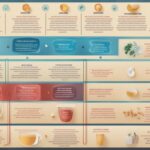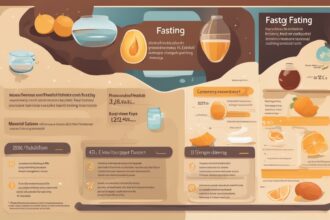Hey there, fellow health enthusiasts! If you’ve been exploring the world of fasting, you’ve likely heard about the incredible fasting benefits—from weight loss to improved mental clarity. But let’s get real for a moment: fasting isn’t always a walk in the park. While the rewards can be amazing, there are potential side effects that can catch you off guard if you’re not prepared. In this deep dive, I’ll walk you through the common side effects of fasting, share practical tips to manage them, and back it all up with science. Whether you’re a newbie to intermittent fasting or a seasoned pro with extended fasts, understanding these challenges will help you fast safely and effectively. Let’s unpack what your body might experience and how to make the most of your fasting journey.
Why Fasting Side Effects Happen: Understanding Your Body’s Response
When you fast, your body switches gears. Instead of relying on food for energy, it taps into stored glucose and fat. This metabolic shift is at the heart of many fasting benefits, like improved insulin sensitivity and fat loss (Mattson et al., 2017). But this transition isn’t always seamless. Your body might protest as it adjusts to lower calorie intake or extended periods without food. Hormones like ghrelin (the hunger hormone) can spike, while blood sugar levels may dip, triggering a range of physical and mental responses. The severity of side effects often depends on factors like your fasting method—be it intermittent fasting, water fasting, or time-restricted eating—your health status, and how prepared you are. Let’s break down the most common side effects and why they occur.
Common Physical Side Effects of Fasting
Your body can throw a few curveballs during fasting, especially if you’re new to it. Here are some physical side effects you might notice:
- Hunger Pangs: It’s no surprise that fasting can make you hungry. Elevated ghrelin levels signal your brain that it’s time to eat, often leading to stomach growling or discomfort (Cummings et al., 2001).
- Fatigue and Low Energy: As your body adapts to using fat for fuel (a process called ketosis), you might feel sluggish, especially in the first few days of a fast.
- Headaches: Dehydration or caffeine withdrawal (if you’re cutting back on coffee) can trigger headaches during fasting. Low blood sugar may also play a role (Torelli et al., 2010).
- Dizziness or Lightheadedness: A drop in blood pressure or electrolytes can make you feel woozy, particularly if you stand up too quickly.
These symptoms are often temporary and can be minimized with proper preparation. For instance, staying hydrated and easing into fasting with shorter durations can make a big difference in how you feel.
Mental and Emotional Challenges During Fasting
fasting doesn’t just affect your body—it can mess with your mind too. While many people report mental clarity as one of the top fasting benefits, the road to get there isn’t always smooth. Here’s what you might experience mentally and emotionally:
- Irritability (aka “Hanger”): Hunger can make you cranky, especially if your blood sugar dips or you’re not used to skipping meals.
- Brain Fog: During the initial adjustment, you might struggle with focus or memory as your brain adapts to alternative energy sources like ketones (Veech, 2004).
- Stress or Anxiety: Worrying about hunger or breaking your fast can heighten stress, especially if fasting feels restrictive.
- Mood Swings: Hormonal fluctuations and low energy can lead to emotional ups and downs during a fast.
I’ve been there—feeling like a grump just because I skipped breakfast during my first 16:8 intermittent fasting attempt. The good news? These mental hiccups often fade as your body gets accustomed to fasting. Practicing mindfulness or distracting yourself with light activities can help smooth out the rough patches.
Potential Long-Term or Serious Side Effects to Watch For
While short-term side effects are usually mild, prolonged or extreme fasting can lead to more serious concerns, especially if not done under medical supervision. It’s important to balance the pursuit of fasting advantages with awareness of risks. For example, extended water fasting (beyond 72 hours) without proper electrolyte intake can lead to imbalances, potentially causing heart arrhythmias (Kerndt et al., 1982). Nutrient deficiencies are another concern if fasting becomes a long-term crutch for weight loss instead of a balanced tool. Women might also experience menstrual irregularities due to caloric restriction impacting hormonal balance (Meczekalski et al., 2014). If you have pre-existing conditions like diabetes or eating disorders, fasting could exacerbate issues, so consulting a healthcare provider is a must. Listening to your body and knowing when to stop is key to avoiding these pitfalls.
Practical Tips to Minimize Fasting Side Effects
Now that we’ve covered the potential challenges, let’s talk solutions. Fasting doesn’t have to be a struggle, and with a few tweaks, you can maximize fasting health benefits while keeping side effects at bay. I’ve tried these strategies myself, and they’ve made a world of difference. Start with shorter fasts, like a 12:12 schedule (12 hours fasting, 12 hours eating), before jumping into longer ones like 18:6. Hydration is non-negotiable—aim for at least 8–10 glasses of water daily, and consider adding a pinch of salt to replenish sodium lost during fasting. If headaches or fatigue hit, rest more and avoid overexerting yourself. Breaking your fast with nutrient-dense, easy-to-digest foods like broth or avocado can also prevent digestive upset. Lastly, don’t hesitate to stop if you feel unwell—fasting should enhance your health, not harm it.
How to Know if Fasting Is Right for You
Fasting isn’t a one-size-fits-all solution. While the fasting perks—like autophagy (cellular cleanup) and reduced inflammation—are backed by research (Bagherniya et al., 2018), they don’t guarantee it’s safe or suitable for everyone. If you’re pregnant, breastfeeding, underweight, or managing chronic conditions like diabetes, fasting could do more harm than good. Even healthy individuals should ease in gradually and monitor how their body responds. I remember feeling overwhelmed when I first started, wondering if the hunger was worth it. But by tracking my energy, mood, and overall well-being, I figured out what worked for me. Keep a journal to note side effects and benefits, and check in with a doctor or dietitian if you’re unsure. Personalizing your approach is the best way to ensure fasting aligns with your health goals.
In wrapping up, fasting can be a powerful tool for transforming your health, offering fasting benefits like better metabolic health and mental sharpness. But it’s not without its challenges. From hunger pangs and fatigue to more serious risks if done improperly, side effects are part of the package. The key is preparation—start slow, stay hydrated, listen to your body, and seek guidance if needed. My own fasting journey taught me that patience and self-awareness turn obstacles into stepping stones. So, whether you’re curious about intermittent fasting benefits or diving into longer fasts, approach it with care and curiosity. You’ve got this! Share your experiences or questions in the comments—I’d love to hear how fasting is working for you.
References
- Bagherniya, M., Butler, A. E., Barreto, G. E., & Sahebkar, A. (2018). The effect of fasting or calorie restriction on autophagy induction: A review of the literature. Ageing Research Reviews, 47, 183–197.
- Cummings, D. E., Purnell, J. Q., Frayo, R. S., Schmidova, K., Wisse, B. E., & Weigle, D. S. (2001). A preprandial rise in plasma ghrelin levels suggests a role in meal initiation in humans. Diabetes, 50(8), 1714–1719.
- Kerndt, P. R., Naughton, J. L., Driscoll, C. E., & Loxterkamp, D. A. (1982). Fasting: The history, pathophysiology and complications. Western Journal of Medicine, 137(5), 379–399.
- Mattson, M. P., Longo, V. D., & Harvie, M. (2017). Impact of intermittent fasting on health and disease processes. Ageing Research Reviews, 39, 46–58.
- Meczekalski, B., Katulski, K., Czyzyk, A., Podfigurna-Stopa, A., & Maciejewska-Jeske, M. (2014). Functional hypothalamic amenorrhea and its influence on women’s health. Journal of Endocrinological Investigation, 37(11), 1049–1056.
- Torelli, P., Evangelista, A., & Bini, A. (2010). Fasting headache: A review of the literature and new observations. Headache: The Journal of Head and Face Pain, 50(5), 958–964.






